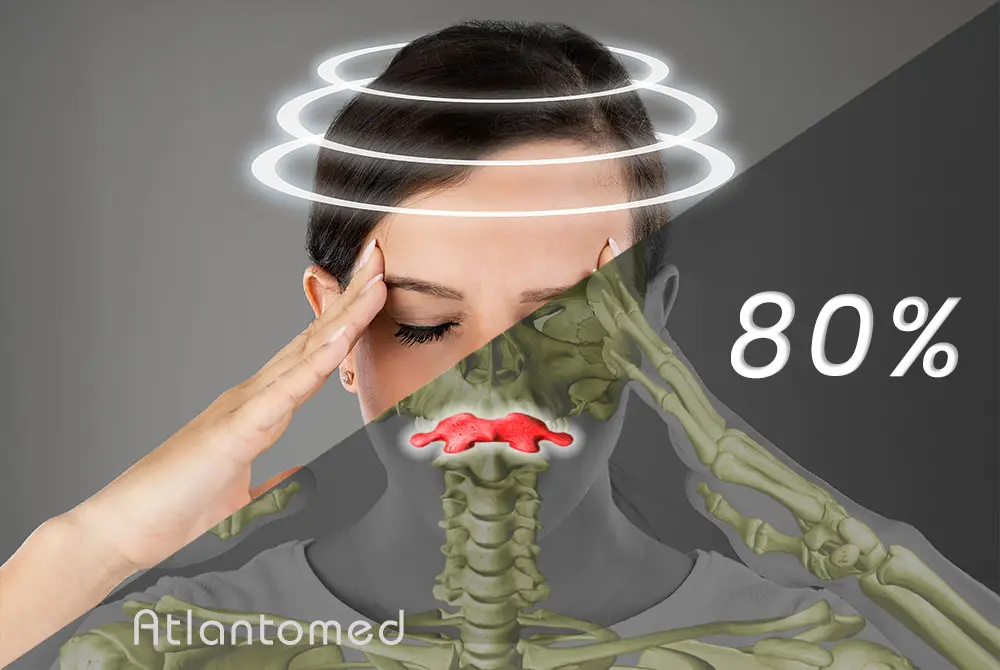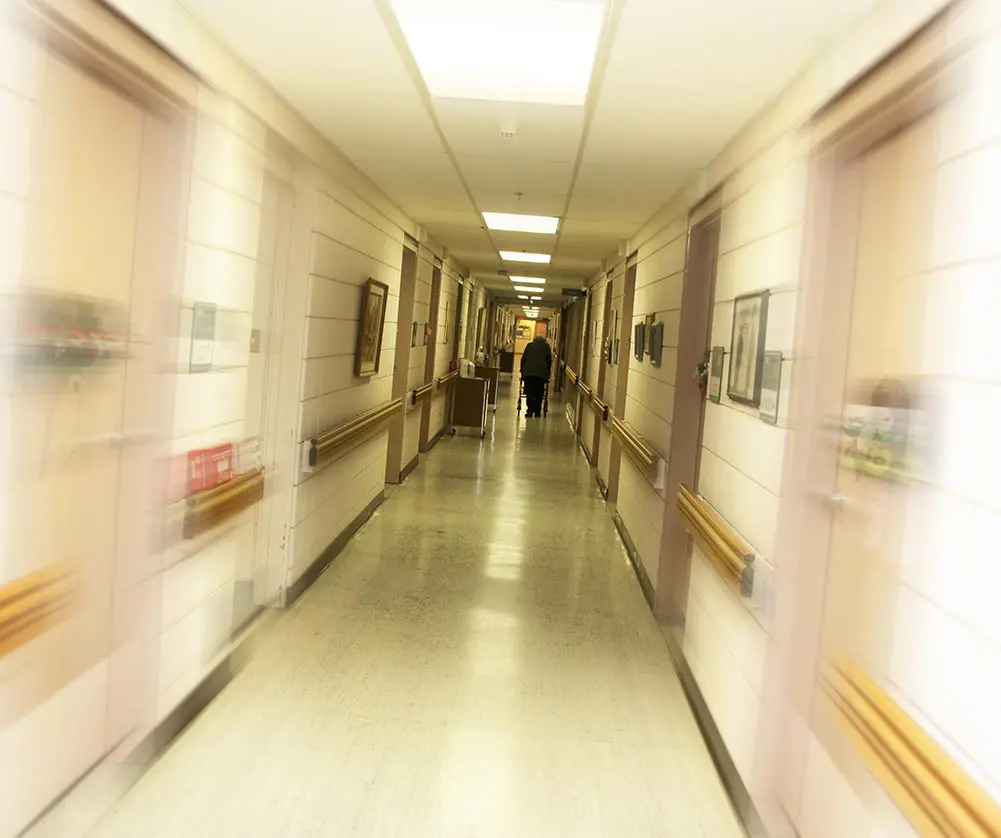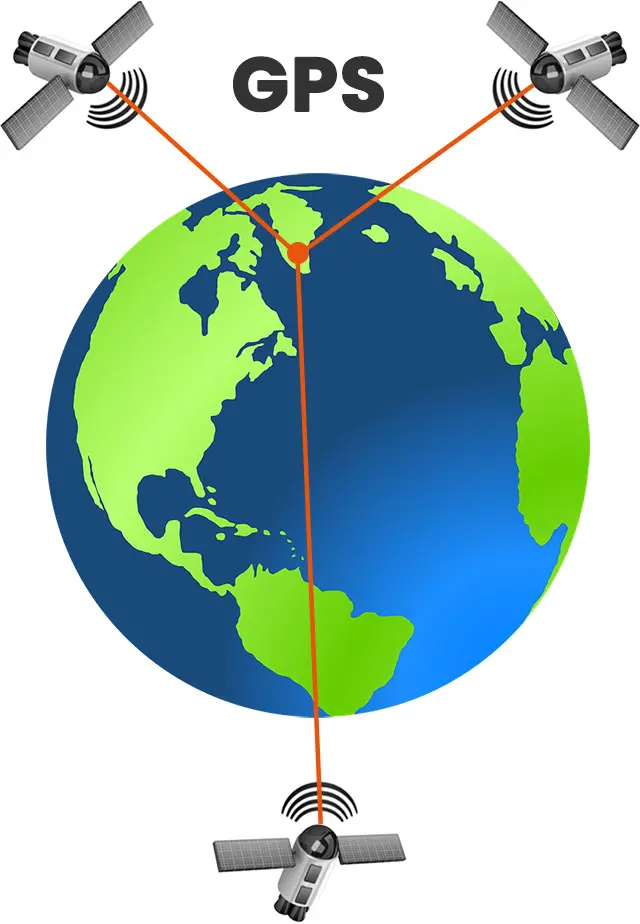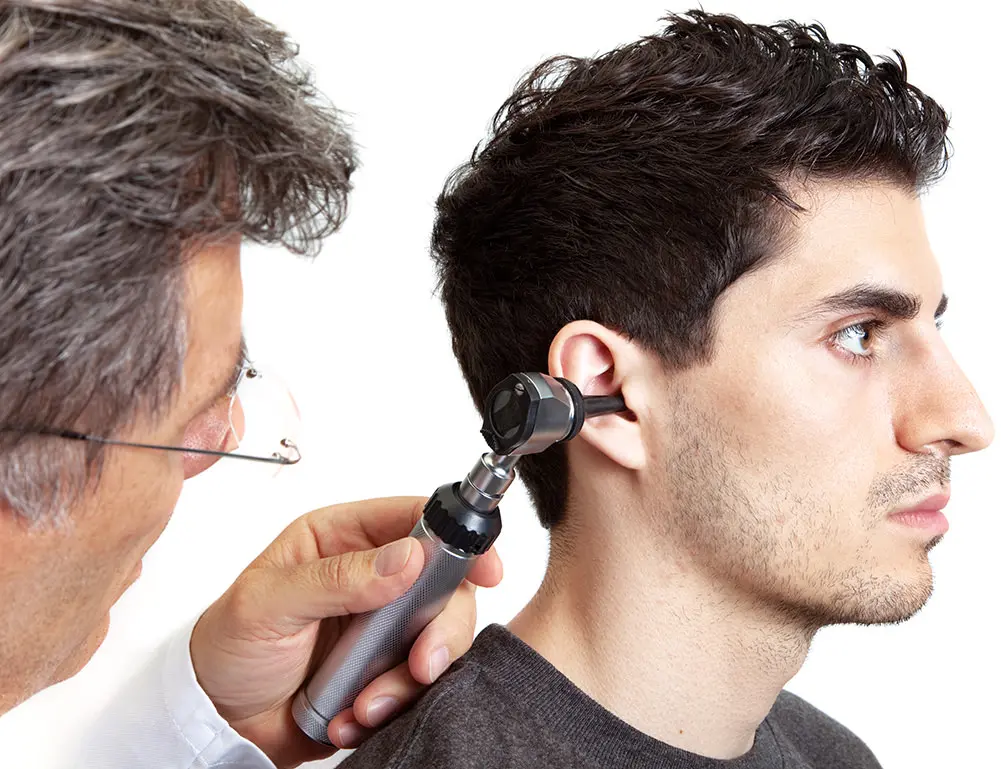Vertigo – dizziness

It is estimated that at least 15% of the population suffers from balance disorders, including vertigo. Therefore, if you are one of them, know that you are not alone.
Following the principle that science is based on observation and deduction, if every time you examine the neck of a person suffering from vertigo you find extreme muscle contractions always in the same muscle groups, would it be unreasonable to deduce a strong correlation between vertigo and muscle tension? If vertigo disappears in 80% of cases as soon as these muscle contractions are relieved and the first cervical vertebra is corrected, is it wrong to state that 80% of vertigo cases have a purely mechanical origin?
Let me ask you this: if the cause of a problem has an 80% chance of being A and only a 20% chance of being B, which one would you logically check first? A or B?
And what if I told you that medical practice usually starts with B, subjecting you to expensive and sometimes invasive tests, completely neglecting to investigate A, only to conclude after their investigations that nothing relevant emerges and that the cause of the disorder is unknown or psychosomatic? After incurring significant costs and wasting a lot of time on practically useless tests, you end up with the usual box of pills in hand, to be taken before or after meals, in an attempt to relieve the symptoms of an unidentified cause. Have you also had this experience?
Here's an example: you notice that your car is handling poorly and tends to swerve, especially in curves. You decide to take it to the repair shop, having noticed that a tire is flat. Even though the problem with the tire is more than obvious, the mechanic starts measuring engine parameters and then begins disassembling it. Wouldn't you think this person is crazy or at least incompetent? After weeks of engine tests, the mechanic FINALLY realizes that the problem could be the tire but states that he does not have the tools to repair it, so he returns the car to you along with an outrageous invoice. What would you think? Yet this is exactly what happens in medical practice, applied not only to vertigo but also to many other symptoms.
80% of cases of vertigo and balance disorders are directly or indirectly of MECHANICAL origin, yet the doctor tries to solve them with CHEMISTRY. What does the saying go? «If the only tool you have is a hammer, you start treating everything as if it were a nail».
The doctor, not being a mechanic, is trained to treat disorders with a chemical approach, becoming an effective promoter of drugs for pharmaceutical companies. When the drugs do not work, as often happens, he proposes a "mechanical" intervention, which usually means surgery, involving cutting and removing body parts. Does this solve the problem? Obviously not, otherwise most of the population would not continue to live with chronic illnesses despite the constant use of medication.
Although this way of proceeding is highly profitable for the medical and pharmaceutical elite, it is far from satisfactory for YOU, the suffering patient. And yet, this is the established medical practice!
Don't you think it would be much more logical and sensible to first address cause A, with an 80% chance of success, and move on to B only if A does not work?
Why vertigo and dizziness?

The upper cervical spine houses most of the proprioceptors, nerve endings specialized in perceiving the body's orientation relative to the surrounding space. In synergy with the balance organ and vision, proprioceptors allow the head and body to orient themselves in a stable and safe manner in the surrounding space. If the proprioceptors send distorted and contradictory signals, it results in an incorrect perception of the movement of the environment. This leads to the sensation that everything around is spinning, an experience familiar to those suffering from vertigo, dizziness, and dizziness episodes.
The mechanism responsible for balance is very dynamic. Multiple stimuli and information are acquired and processed simultaneously to properly control the muscle chains involved, ensuring that the body remains balanced with respect to the surrounding space and Earth's gravity.
The automatic static regulation of balance is complemented by the coordinated regulation of voluntary dynamic movements.
Stability and the related sensation of balance result from a sophisticated equilibrium of forces. When these forces do not act in a synchronized and coordinated manner, imbalances arise, leading to a feeling of instability, dizziness, vertigo, and, in extreme cases, complete spatial disorientation, which may culminate in a sudden fainting episode. How does this happen?

The balance regulation mechanism, still not fully understood, depends on a multitude of sensory inputs. If, for any reason, these inputs do not reach the nervous system for processing, the body will not be able to generate an appropriate neurological response to maintain the balance of the entire musculoskeletal system.
To give a simple example, we can compare the balance of the human body to the operation of a GPS navigator, which everyone surely knows: the location of your GPS on the Earth is determined by calculating the relative distance of at least three satellites.
If the satellite receiver can pick up signals from several satellites, then the position is calculated accurately. If, however, for some reason, most satellite signals are lost, navigation becomes increasingly uncertain. If the signals from the last three satellites are also lost, the GPS will no longer be able to orient itself. In the human body, this situation is equivalent to a fainting condition.
Medical examinations for vertigo, dizziness, and balance disorders

When a patient complains of vertigo, dizziness, or loss of balance, various medical examinations can be performed. First, blood pressure is measured. If it is normal, the patient is referred to an ear, nose, and throat specialist, also known as an otolaryngologist, who looks for possible infections in the throat or ear. Since the balance organ is connected to the inner ear, inflammation in this area can negatively affect balance. Tests are also performed to distinguish between central and peripheral vertigo, such as rotational vertigo, oscillatory vertigo, or vertebrogenic vertigo (originating from the spine).
Sometimes, balance disorders can be caused by the displacement of so-called otoliths/statoliths, small "stones" within the auditory system, which can be repositioned with appropriate maneuvers.
If these examinations do not lead to a conclusive diagnosis, the patient is referred to an ophthalmologist (eye specialist) for further examinations, as vision plays a crucial role in balance. If this consultation also reveals no abnormalities, a magnetic resonance imaging (MRI) scan is usually performed to examine the brain for possible tumors or abnormalities. If this examination is also inconclusive, the patient is declared structurally healthy from a medical standpoint.
After this long and costly process, which in most cases yields no results, medication is prescribed, which sometimes provides initial relief. However, medicine rarely succeeds in identifying a real cause to explain the patient's vertigo. After generously funding the system, the process usually ends with the phrase: "you must learn to live with your vertigo and balance disorders", unless the vertigo resolves spontaneously, which sometimes happens.
In some cases, the disorder becomes so severe that, in addition to vertigo, dizziness, and a sense of insecurity in movements, the patient develops increasing emotional insecurity. This leads the person to withdraw from social life and often even to leave their job, especially if it involves tasks where balance is essential.
Why do you suffer from recurring vertigo, even though the doctor finds no organic cause to explain it?
Too often, vertigo is unfairly attributed to psychological factors, although in reality, these have nothing to do with it, except as a secondary consequence. So, where do these vertigo episodes, dizziness, and feelings of insecurity or disorientation in movements that trouble so many people come from?
Vertigo and dizziness: change your perspective!

As explained before, the function of balance is extremely dynamic and complex, with a multitude of information that must be processed simultaneously. If the impulses and data essential for regulating balance arrive late, are distorted, or do not arrive at all, the brain, like a pocket calculator, will perform operations based on incorrect or missing values, and the result will inevitably be wrong.
Note: the calculator is not defective; it simply receives incorrect values for the calculation.
The Atlas is anatomically located near the vessels that also supply the balance organ, and the same goes for the mandibular condyles. If one, or worse, both of these bones are permanently displaced from their ideal position, they will invade the space reserved for other surrounding anatomical structures, such as blood vessels, nerves, and lymphatic pathways that nourish the vestibular organ.
In people suffering from vertigo or feelings of imbalance, extreme stiffness in the neck muscles is consistently observed, often extending to the shoulders, where 80% of the balance proprioceptors are located.
What do you think happens to impulses and information that necessarily have to pass through nerve bundles compressed by extremely tense muscles? Is it possible that they become altered?
Expecting the balance system to function correctly under these conditions, with constrictions present everywhere, would be like expecting your television to show the match without interference even if you crush or cut the antenna cable with pliers.
Sometimes, vertigo and dizziness disappear immediately after the correction of the first vertebra, also due to the precise massage of the surrounding muscles performed during the AtlantoMed session. In other cases, vertigo or dizziness decreases or disappears gradually over time as the body completes the regeneration process and adapts its structures to the new conditions.
A study shows that AtlantoMed achieves a positive result in 82% of vertigo cases, with 29% experiencing complete remission of the disorder and the remaining 53% reporting a reduction in the frequency and/or intensity of vertigo episodes.
Meniere's disease
Meniere's disease is a collection of symptoms first described by the physician Prosper Ménière and named after him.
Patients who had been diagnosed with Meniere's disease, after undergoing AtlantoMed treatment, realized that their problems were not due to a mysterious condition but rather to an imbalance caused by a misaligned Atlas and excessively rigid muscles that hindered the free flow of fluids. This imbalance can be easily resolved through the correction of the cervical vertebrae and may lead to the disappearance of the dreaded disease.
Sudden fainting – vasovagal syncope
Experience shows that many people suffering from sudden fainting without apparent causes, especially when extending the neck backward, stopped experiencing these episodes after AtlantoMed treatment.
This result is attributed to the release of the vertebral artery from the abnormal compression exerted by the Atlas during backward neck movement and the cessation of abnormal stimulation of the vagus nerve, as described on the page dedicated to effects on the nervous system.
And finally...
At first, many people are incredulous when reading this website, especially when they watch interviews where others share their stories. After years of suffering and medical indoctrination, what they read here may seem like science fiction. Yet, it is all true, and 10,000 testimonials in various languages confirm it.
Some may wonder why doctors do not widely apply this method if it is so effective. If you haven't noticed yet: conventional medicine has no real interest in a definitive solution – the patient must remain a patient. Money is made from the sick, not from the healthy.
Video Interviews About VERTIGO
By watching some video interviews or reading the many testimonials of people treated with AtlantoMed, you will realize two things:
opinions after Atlas realignment
Some Reviews from the Forum
- Antonio: I had been suffering from vertigo and instability for 2 years
- Maria Teresa: Unexplained vertigo resolved!
- Ottavio: Vertigo attacks: IMPROVED QUALITY OF LIFE
- Barloggio Franco: Vertigo, dizziness, and labyrinthitis: A NEW LIFE
- DanielaB: Vertigo: I got my life back!
- @ALEX@: Vertigo: Everything disappeared in about 30 days
- MaTi: Vertigo gone
- Other testimonials: vertigo - dizziness - loss of balance
What People Say About Us
Beware of those who disguise a simple cervical manipulation as Atlas realignment and those who offer low-quality imitations of our method. The results speak for themselves: over 10,000 testimonials and reviews in various languages make us unique. Click to discover opinions, ratings, and authentic experiences shared by those who have experienced Atlas correction with Vibro-Resonance AtlantoMed:




